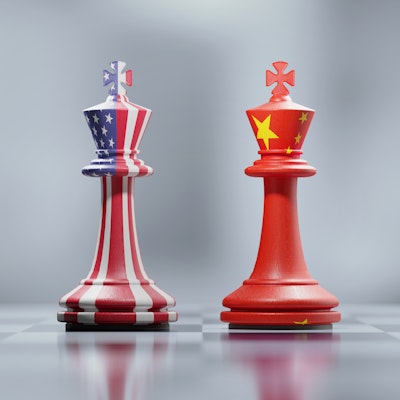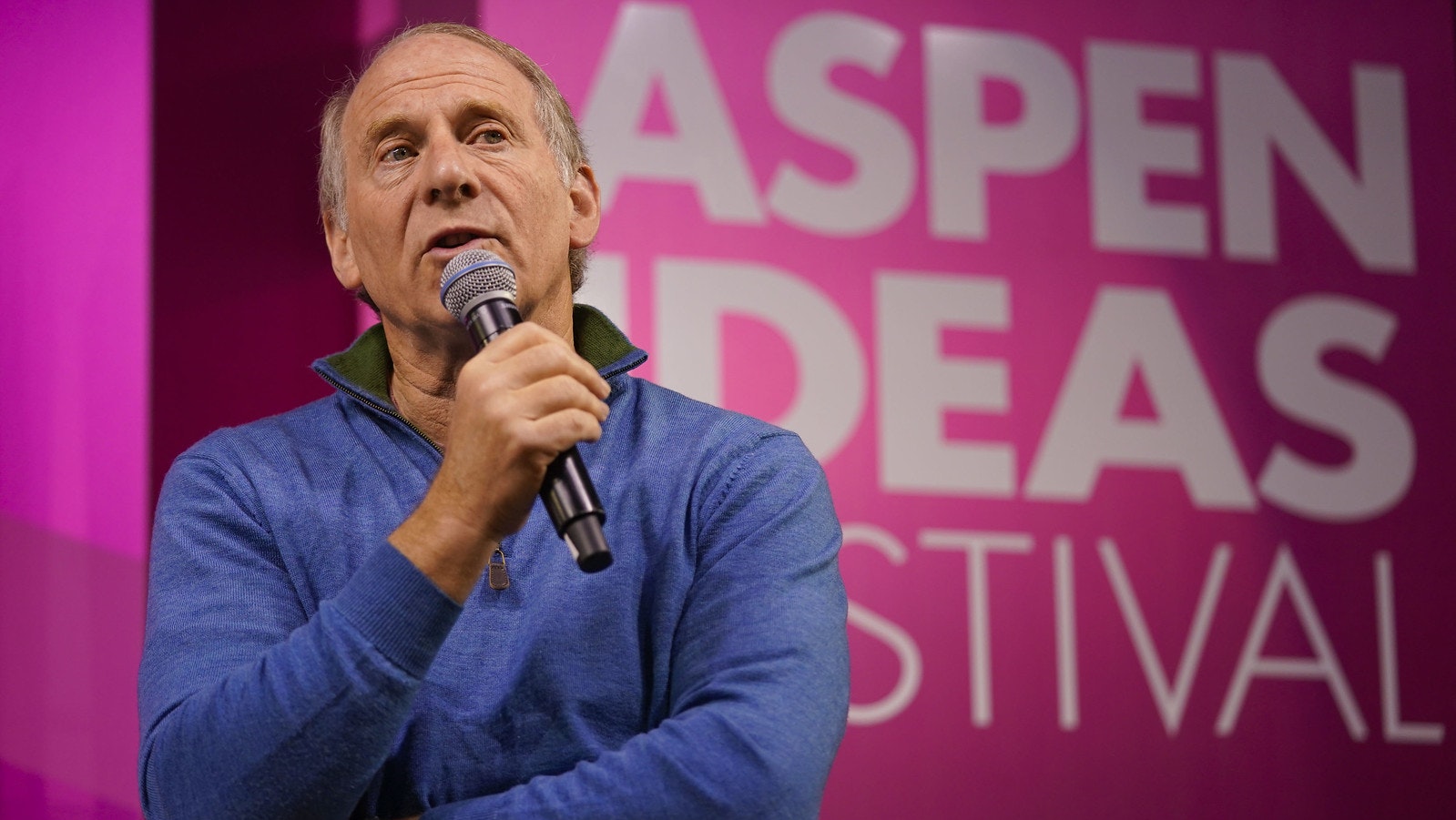
The Return of Rivalry
Setup
After decades with no significant geopolitical rivals, the United States now faces the emergence of China as a major adversary. How will this change the landscape of the emerging world order? What new forms of geopolitical conflict will arise, and what new forms of cooperation are necessary?
- 2019 Festival
- World
- USA
- Economy
- Full transcript
Frenemies? US-China rollercoaster
Moderator Nicholas Thompson, editor in chief of WIRED, begins the conversation by asking the panelists to weigh in on the historical evolution of the United States’ relationship with China. Richard Haass, president of the Council on Foreign Relations, points to the end of the Cold War as the time when the two countries became more economically intertwined. “What’s happened over the last few years,” he says, “is this is a relationship that lost its foundation because the economics have become as much a source of friction as they have a foundation.”
Big IdeaAmerican policy makers need to devise a strategy for a new international order that has a stronger China as part of it — thinking about where we can accept Chinese power and where it is reasonable for China to make additions to the international order.Mira Rapp-Hooper
There was a strong hope, says Mira Rapp-Hooper, senior fellow at the Council on Foreign Relations, that as China became increasingly ensconced in the international order, the rules and norms that govern international politics would change China more than China would change them. “From the perspective of many foreign policy thought leaders, that set of assumptions has been dashed, in particular by the rise of Xi Jinping,” she explains.
So how do we prevent conflict from escalating between the two countries? Robert Kagan, senior fellow at Brookings, believes that China doesn’t want to have a war with the United States. He suggests a strategy of military containment along with economic engagement, or in other words, “deter them from throwing their weight around militarily and saying to them, in effect, we want you to get rich.”
The technology race
“One of the things that worries me the most,” says Nicholas Thompson, “is that the technology sphere splits in two and you end up with a technology cold war, where the entire technology stack of certain countries can either be built on Chinese technology or Western technology.” Watch the panel discuss the forces at work in the technology race and the Trump administration’s stance on tech policy:
It’s crucial that we work with our allies in Asia to create a mutual strategy for tackling Chinese technology, says Mira Rapp-Hooper, rather than alienating them through tariffs and competition with Huawei. If we don’t, she emphasizes, “we’re putting our allies in a position that they fundamentally don’t want to occupy. And that is a world where they’re asked to choose between the United States and China.”
Reversing democratic decline
What can we do to counter authoritarianism and reverse the trend of democratic decline? First off, says Robert Kagan, we can stop supporting dictatorships. He also emphasizes the importance of maintaining the coherence of the liberal world order. “If we are coherent,” Kagan says, “these rival powers pose much less of a threat.”
-

Richard Haass: The American political and economic model has lost a lot of altitude...So one of the reasons I think that the balance has shifted towards authoritarians is we’re not as attractive an alternative; more people [are] looking at the authoritarian model saying it looks more stable, more capable, economically performing better …We have essentially unilaterally disarmed in the competition for ideas, so our model isn’t as attractive and we’re not promoting it.
China, Trump, and the 2020 election
Presidential elections are increasingly a global affair. A member of the audience asks the panel to consider the road to 2020 from China’s point of view. Does China want a two-term Trump presidency? Are there other attractive candidates from China’s perspective? Watch the panel tackle these questions and reflect on the 2016 election:
Learn More
Additional Information
Resources
A World in Disarray: American Foreign Policy and the Crisis of the Old Order
Council on Foreign Relations
The Jungle Grows Back: America and Our Imperiled World
Explore More
World


While the workforce continues to evolve in response to economic shifts and technological advancements, one thing is certain — the traditional blueprints for education and the...

Entrepreneurs view the world differently. Where others see challenges, they see opportunities. They’re a group of self-starters and strivers with the courage to take big risks...

Global conflicts and health crises have put into stark relief deeply-ingrained gender roles in society. Yet the past years have also seen record-high numbers of women running...


Creativity is as intrinsic to our species as any of our basic instincts, says Debbie Millman, designer and curator. But for millions of people in the United States, the abilit...


Advances in medicine and healthy living mean that more and more people will live to be 100. But just because their bodies can last doesn’t mean their bank accounts will keep u...

Of course, Black history shouldn’t just be a month-long nod on our yearly calendar — it is inextricable from American history and fundamental to the very soul of our nation an...


Scholars are still uncovering information about Britain’s involvement in the transatlantic slave trade and its era of slavery, piecing together how the wealth generated from t...


Many more Americans are struggling to survive and make ends meet than is typically portrayed in the media and public policy debates. And when poverty is depicted, harmful and...


Relations between the United States and China have become increasingly tense over the past few years. Trade wars have escalated, and U.S. national security experts are bracing...


America’s “second founding” came on the heels of the Civil War, when the architects of the 13th, 14th and 15th amendments thought long and hard about how to enshrine civil rig...

The United States spends $4.3 trillion—almost one fifth of the nation’s GDP—on health care. As the scale of the medical enterprise expands, venture capitalists are pursuing th...


It’s been decades since the United States has updated its immigration policies in any sort of comprehensive way, and the problems and suffering at the southern border have per...

Three people whose lives have been irrevocably changed by the Israel-Palestine conflict share their stories of profound loss, grief and forgiveness.

In a time of growing wealth disparity and changing societal values, can capitalism adapt? How is the economy being transformed by investments in infrastructure, AI, energy, an...


Whether they publicly tout it or not, U.S. technology companies play a powerful role in politics, cultural issues and the way we live. Founder and investor Peter Thiel is one...

The 2024 presidential election is only months away, and the past few weeks alone have brought shocking headlines that change the political ground we stand on — an attempted a...


Sizable electorates around the world are flocking to populist candidates who promise power, domination and a return to better times. The global experiment in liberalism seems...


Conflict and suffering can bring out the worst in people, but it can also bring out the best. This is one of the lessons New York Times columnist Nicholas Kristof has learned...

The war in Ukraine continues to reshape European security and global alliances, while the war in Gaza raises urgent questions about humanitarian aid and international interven...


The federal right to abortions in the United States has been overturned, access to contraception and IVF services are threatened in many states, and the gender wage gap persis...














